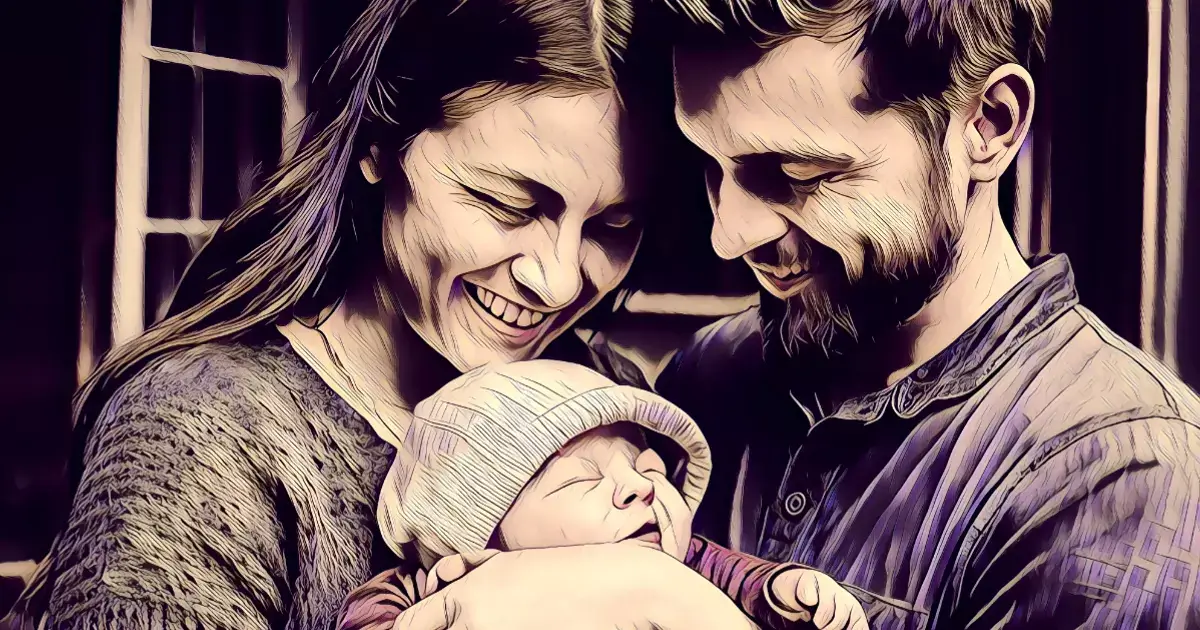Decoding 9 contrasts: childhood love vs. marriage experience!
This blog post may contain affiliate links. If we find a product or service to be useful, we encourage you to visit the website via that link. If you make a purchase through our referral link, we may receive a commission. Rest assured, you will not be charged any additional fees. By using these links, you can support us while making your purchase. For more information visit here.
Exploring the dynamics of romantic relationships from childhood to adulthood!
Love, in its many forms and variations, has been a defining aspect of human existence since time immemorial. In this difficult network of emotions, childhood love holds a special place—pure, innocent, and untainted by the complexities of adulthood.
Marriage, without a doubt, is a beautiful demonstration of love that encompasses commitment, growth, and compromise. It symbolizes a mature and deep love that embraces the realities of a shared life.
The stark differences between childhood love and marriage experiences encapsulate vital reflections of human emotions maturing through time.
Marriage offers a beautiful framework in which couples discover profound connections that go beyond the initial rush of infatuation.
It is a harmonious union that emerges from appreciating each other’s strengths and providing support in times of weakness.
As we progress from our youthful years to becoming adults, our perception and comprehension of love undergo a remarkable transformation.
We should examine the differing views on romance and marriage from childhood and how they offer valuable insights into the development of relationships.
Let’s contrast the childhood love vs. marriage experience!
Childhood Love Compared to the Marriage Experience: 9 Contrasts!
Love, in all its forms, is a complex and beautiful part of life. As we grow older, our understanding of love evolves, shifting from innocent childhood crushes to the profound connection experienced by married couples. Let’s delve into the contrasting aspects of childhood love and marriage, exploring how they shape our lives.
1. Innocence versus responsibility
Childhood love is innocence personified—a world where feelings are pure and untainted by responsibilities. In reverse, marriage brings responsibility as partners navigate shared financial obligations, household tasks, and possibly raising children together.
2. Transience versus permanence
In our younger years, affection may come and go like changing seasons; childhood love often fades away as quickly as it blossoms. However, marriages aim for lasting commitment, with vows made to withstand challenges and remain united in all circumstances.
3. Infatuation versus deep connection
Infatuation takes over childhood romance—that overwhelming obsession with another person without truly knowing them inside out or forming an emotional connection beyond temporary fascination.
Marriage relies on cultivating a deep connection built over time—trust that withstands storms, allowing both individuals to grow emotionally together.
4. Simplicity versus complexity
Childhood relationships possess a sweet charm, while marriage encounters complexities arising from the intertwining of personal histories and external factors like work pressures or societal expectations.
5. First Experiences versus Evolving Dynamics
When experiencing childish love during their formative years in school or playgrounds, children learn valuable lessons about companionship but haven’t yet experienced the evolving dynamics found in long-term commitments like marriage, which require adaptation through various stages of life together.
6. Cluelessness Versus Fulfilled Desires:
Childhood crushes often have an element of cluelessness—uncertain if those emotions will ever materialize into fulfilling partnerships later on in life. When couples build the right foundation, marriage fulfills desires for companionship, intimacy, and emotional support on a deeper level.
7. Carefree versus investment
Love during childhood thrives in a blissful bubble where time and effort are not major factors, evolving effortlessly if destiny allows.
Unlike other relationships, marriages demand ongoing commitment and effort from both individuals involved.
This can include providing each other with constant emotional support and actively overcoming challenges together. It is through this dedication that the bond between partners can flourish and grow stronger as time goes on.
8. Expectations versus acceptance
In childhood relationships, expectations can often be idealistic and superficial because of limited exposure to real-world experiences.
However, marriage encourages learning that no one is perfect, with acceptance becoming an integral part of understanding each other deeply.
9. Passion Versus Stability
Childhood love often revolves around passion—ferocious emotions that burn fast but may not endure forever. Marriages strive for stability—long-lasting commitment based on trust and shared goals—as couples build solid foundations together.
While childhood love captures innocent hearts with its simplicity and fleeting magic, married life encompasses depth, commitment, and responsibility—a journey underpinned by lasting connections despite the challenges faced along the way.
Both experiences shape us into who we ultimately become—an amalgamation of youthful fantasies entwined with mature realities.

Let’s shed light on childhood love versus marriage love.
Childhood Love Versus Marriage Love: Exploring the Boundless Depths of Human Connection!
Love is a profound emotion that takes various forms throughout our lives. While childhood love and marriage love both hold immense significance, they differ in their essence, depth, and intricacies. In this section, we will delve into these two unique realms of love and shed light on nine distinct points that distinguish them from one another.
1) Innocence vs. Maturity
Childhood love blossoms in a realm untouched by societal expectations—genuine affection fueled purely by innocence. It is an uncomplicated bond characterized by shared playfulness and the simple joys of companionship.
In contrast, marriage and love thrive through growth and maturity. Built on years of understanding and compromise, it embodies commitment alongside deep emotional intimacy born out of shared experiences.
2) Romantic fantasies vs. realities
In childhood love, young hearts often prioritize romantic fantasies over reality, guided by whimsical ideals nurtured through countless tales and fairy stories.
As individuals grow older and transition into marriage’s domain, realities give way to deeper connections built on authentic communication grounded in mutual understanding.
3) Carefree Affection vs. Lasting Commitment
Childhood infatuations exhibit carefree affection unburdened by long-term commitments or responsibilities typically found within mature relationships such as marriage.
These youthful encounters may ignite fleeting sparks, but eventually dissolve like wisps of summer wind, with time playing its part in transforming childish emotions into something more concrete.
4) Futuristic vision vs. presence in the moment
Childhood crushes often involve visions of an idyllic future bereft of real-world complexities. The dreams woven together become bubbles filled with endless possibilities for happiness ever after, where reality seems far away yet within grasp at once.
Entering married life—a milestone deeply rooted in aspirations and prevailing challenges—demands that we now focus on cultivating present bonds and shared aspirations together.
5) Parental Advisory vs. Independent Decisions
In childhood love, parents who ensure their children’s emotional well-being and protect them from harm often monitor or guide such relationships.
Within the sphere of marriage love, individuals exercise autonomy in decision-making with a partner as equal stakeholders in a joint venture, fostering growth and contributing to the betterment of each other’s lives.
6) Naïve Expectations vs. Reciprocal Give-and-Take
Childhood love often involves frank expectations that arise from limited life experiences, where selflessness may not yet be fully nurtured or understood.
Companionship built on commitment and sacrifice in marriage enables the realization of mutually beneficial trade-offs, which are seldom found elsewhere.
7) Blossoming time vs. sustained nurturing
While childhood affections can bloom and disappear quickly like spring petals carried away by playful zephyrs of change, marriages demand continuous nurturing for the long-lasting sustenance of mutual emotions that have gone beyond initial infatuation into everlasting devotion—a journey requiring patience, understanding, and unwavering support.
8) Friendships Enhanced vs. Life Partnerships Formed
Childhood crushes often lead to deep friendships filled with laughter and exciting adventures in hidden places, while marriage is an appealing option for those seeking a lifelong connection.
In marriage, there is an abundance of experiences interwoven as time goes on, creating a steadfast bond that withstands storms and shared trials, providing solace as well.
9) Unconditional Affection vs. Mutually Invested Love
Ultimately, childhood love exhibits an innocence encompassing unconditional affection wherein flaws can’t tarnish feelings. But marital connections prioritize investing efforts in building fulfilling, future-characterized, passion-fueled, genuine admiration foundations.
Enduring relationships, grounded in trust, empathy, and respect, foster stronger bonds that withstand tests throughout the years and remain unwaveringly intact. Faithful, ever-evolving desires and hearts intertwined serve to guide light through labyrinth existence.
Sum up:
Childhood love and marriage love offer unique experiences in life’s journey of connection. Love offers distinct experiences in life’s journey of connection. While childhood provides the joy of innocent affection and dreams, marriage fills our lives with deep companions.

Childhood love versus romantic relationships in marriage
Eternal innocence or passionate bonds? Unraveling the Magic!
Love, in its many forms, is a universal language that has captivated humanity since time immemorial. Often overlooked are the enchantingly pure and innocent relationships formed during childhood, contrasting with the complex dynamics of romantic relationships later in life.
While both kinds of connections hold their own allure and significance, exploring the contrasts can shed light on what each lends to our understanding of love itself.
1. Nurturing Seeds: The Joyful Origins
Childhood friendships bloom like fragile flowers under radiant sunlight—forged spontaneously without prejudice or judgment.
Building these tender bonds is an irreplaceable part of early life, as interactions are devoid of societal expectations or personal baggage.
These pure connections are born out of mutual interests and shared innocence, leading to playful moments filled with laughter and endless adventures.
Whether it’s chasing butterflies together or sharing secrets tucked away in treehouse hideaways, a child’s love knows no boundaries.
2. Inexplicable Comfort: The Safe Haven Effect
Where adulthood often demands fortification against emotional vulnerability due to fear and past traumas, childhood offers a precious haven unaffected by such worries.
Within this sanctuary lies unwavering trust—a constant companion rooted in youthful invincibility where openness reigns supreme.
While adult relationships may come with implicit doubts and fears born from years of conditioning or previous heartbreaks, children partake wholeheartedly, knowing little beyond genuine kindness and loyalty towards one another.
3. Simplicity Defined: The Beauty Within Limits
As we transition into adolescence and young adulthood, marked by burgeoning romantic feelings for others, juxtaposing those intense emotions with fond memories from childhood reveals striking differences in how love evolves as time goes on.
Romantic relationships naturally entail more complexity as individuals navigate feelings intertwined with societal pressures surrounding commitment, expectations for physical intimacy, and compatibility.
In contrast, childhood friendships are often free from such weighty concerns; pure love appears through boundless playfulness and innocent affection.
4. Romantic Relationships: The Fireworks of Passion
Romance ignites like a dazzling fireworks display—explosions of passion and electrifying connections feeding on intense emotions that encompass desire, infatuation, and intimacy.
As adults experiencing romantic love, we create memories embedded with shared experiences, stolen glances, and whispered promises for eternal togetherness.
The journey through these relationships imparts valuable life lessons about empathy, compromise, and personal growth.
While issues might surface along the way because of differing worldviews or shifting priorities, navigating tumultuous waters can pave the way for deeper emotional connection—a testament to human resilience amidst adversities in the pursuit of love.
5. Mutual Evolution: Balancing Childhood Innocence with Adult Love
As individuals mature into adulthood without completely forsaking their inner child’s spirit, having experienced both sets us on an extraordinary course—one where elements from childhood intertwine effortlessly with aspects cultivated during adult romantic relationships.
Recognizing the immeasurable beauty inherent in preserving innocence while cherishing moments shaped by passionate romances enables a more profound appreciation for diverse manifestations of love throughout our lives’ journeys.
Sum up:
Childhood love serves as a timeless reminder that genuine connections, devoid of societal constructs or expectations, can bring immense joy and comfort.
Simultaneously, navigating complex terrain characterized by romantic feelings facilitates personal growth, drawing upon invaluable life lessons.
In embracing both realms, we find a remarkable synthesis—an understanding that each facet contributes to our understanding and celebration of one universally powerful force: love.
Childhood Love versus the Night of Marriage
A Journey of Growth and Transformation
Most people, or all of us, consider love to be an emotion that transcends time and has no boundaries or limitations.
This sentiment can manifest in various forms throughout our lives, but two significant milestones where love takes center stage are childhood romance and the night of one’s marriage.
These moments in time represent contrasting stages of life: innocent infatuation juxtaposed against immense commitment and maturity.
Childhood love has its own unique beauty, untainted by society’s expectations or constraints.
It blossoms amidst carefree days spent playing under the warm sun, sharing secrets with not-so-secret glances, and experiencing pure joy from simple shared moments.
This form of love affirms our innate human need for companionship while nurturing essential emotions like trust, loyalty, and understanding.
At this tender age, when innocence thrives alongside burgeoning curiosity about relationships, true love encompasses pure admiration without any ulterior motives.
Childhood crushes teach us the exhilarating warmth that comes with affectionate gestures—a stolen glance across a crowded classroom or shyly exchanging notes, confessing youthful desires.
But as the years pass by swiftly, this captivating innocence gives way to adulthood’s more serious pursuits.
A New York-based software company is seeking remote workers to handle Facebook comments, offering a daily salary of $175 and comprehensive training. Applicants must have internet-connected devices and be proficient in Facebook comments. Apply now!
Childhood love versus the wedding night
The special moment arrives when we unite our destinies with another soul on the night of marriage—an event charged with hopes, dreams, fears, and uncertainties all intertwined into an elaborate tapestry woven over years together.
The vows exchanged on the night of marriage speak volumes about what lies ahead; they serve as pillars supporting a foundation built upon deep bonds forged through trials faced hand-in-hand.
Promises made during these sacred ceremonies emanate profound commitment—”in sickness and in health,” “for better or worse”—encapsulating every facet of life’s unpredictable journey yet to unfold.
This metamorphosis from childhood love to adult commitments within a marital union marks personal growth fueled by experiences gained along life’s winding path.
It demands perseverance in overcoming challenges; it asks for understanding and compromise to sustain a love that, in its infancy, bloomed without effort.
Certainly, the night of marriage comes with its own concoction of emotions: joy, excitement, and nerves. Yet within this splendor lies the beauty of two souls choosing to unite their lives permanently.
Just like childhood, infatuation once ignited sparks among young hearts on playgrounds or amidst school corridors. Marriage kindles those flames anew under different circumstances.
This juncture calls for an unshakable foundation in which both partners navigate life’s uncertainties together. It is through challenges that love perseveres and reaches new depths, replacing youthful dreams with shared ambitions and constructing a future intertwined as one.
While childhood romance exists within sunny days filled with laughter and carefree abandon, the night of marriage transports us into adulthood—a realm where companionship strengthens our resolve during each chapter life presents.
Together, we grow into individuals enriched by shared experiences rather than driven solely by flying emotions; we create lasting memories rooted not only in affection but also in trust and compassion.
Sum up:
Childhood love versus the night of marriage encapsulates two contrasting chapters within the vast fabric of life’s journey, each contributing immensely to our personal growth as individuals.
From innocent obsessions grounded in sweet simplicity to lifelong commitments fortified by years spent conquering obstacles hand-in-hand, these moments shape who we are and what we become.
The essence of true love lies in cherishing both stages equally and acknowledging their unique charms.
It is about embracing all forms that love takes throughout life’s incredible voyage and forever treasuring the cherished memories woven into the fabric of our existence.

Unraveling the Boundless Love Between Parents and Children
The bond between a parent and child is an extraordinary connection that defies all logic and boundaries. It is a love so profound that it transcends time, hardships, and even distance.
As we explore this deeply intertwined relationship in greater detail, we uncover the true essence of what love truly means.
1. A Sacred Connection
Love between parents and children begins at the very moment life emerges into existence. An innate sense of responsibility, combined with unconditional affection, forms an unbreakable bond that lasts a lifetime.
This sacred connection shapes both parties as they navigate through various stages of development together.
2. Nurturing unconditional love
Unconditional love is inherent to parenthood—a love devoid of expectations or conditions. Parents provide emotional support, understanding, and guidance, demanding nothing in return from their children.
This unwavering devotion allows for personal growth while ensuring stability within the familial unit.
3. Sacrifice and selflessness
A parent’s greatest investment lies not in material possessions but in dedicating themselves entirely to their child’s well-being—body, mind, and soul.
Parents selflessly put aside their own desires to bolster those of their offspring; they strive to foster an environment where dreams become reality.
4. The Power of Protection
Parents have an essential role as protectors, tirelessly keeping their children safe from both physical and emotional harm, and being a constant source of support during challenging times.
This demonstration creates trust, which evolves into resilience within individuals raised with unwavering parental care.
5. The Language of Support
Emotional support is another invaluable aspect exemplified by loving parents toward their children.
We can see an authentic display through active listening as parents readily offer encouragement amidst triumphs or solace during moments of defeat.
Children who receive these gestures comprehend empathy firsthand while cultivating the essential skills necessary for healthy relationships later in life.
6. Love as a Guiding Light
The love between parents and children serves as the compass, guiding them through significant milestones, hard decisions, and life’s perplexities.
As children grow, they internalize these teachings into their own moral compasses: lessons of kindness, honesty, perseverance, and compassion their parents have imparted with an outpouring of love.
7. The Circle of Life
Throughout time, it becomes apparent that this bond holds significance even beyond the child’s formative years.
Parents witnessing their offspring evolve into loving adults experience a profound sense of pride while reflecting upon how the nurturing energy they invested has flourished within them to benefit future generations.
Sum up:
Love between parents and children is much more than just an emotional connection. It is a masterpiece painted with selflessness, sacrifice, guidance, protection, empathy, and growth.
This sacred bond enriches lives on both sides by fostering individual development while instilling lifelong values necessary for creating sturdy foundations in society.
Cherishing this extraordinary relationship ensures the legacy of unwavering love endures across successive generations.
Concluding Thoughts
Both marriage experience and childhood love shape our lives through two distinct aspects of human connection.
Innocence and shared playfulness define childhood love, whereas marriage entails responsibility and commitment.
The love that blossoms during childhood has the incredible power to thrive in a delightful bubble, growing organically when destiny allows.
Marriage requires continuous commitment and effort, offering emotional support, and actively conquering challenges.
Both experiences have the power to mold us, fusing the dreams of our youth with the wisdom of adulthood.
A love story that begins in childhood and continues into adulthood is a beautiful example of the strength of the human spirit and the ability to overcome adversity. Thank you.
Understanding the importance of copyright law is absolutely vital, as it strictly prohibits any reproduction or replication of works without the explicit permission of the author. Any unauthorized duplication of content will lead to legal action for copyright infringement under Section 14 of the Copyright Act.











